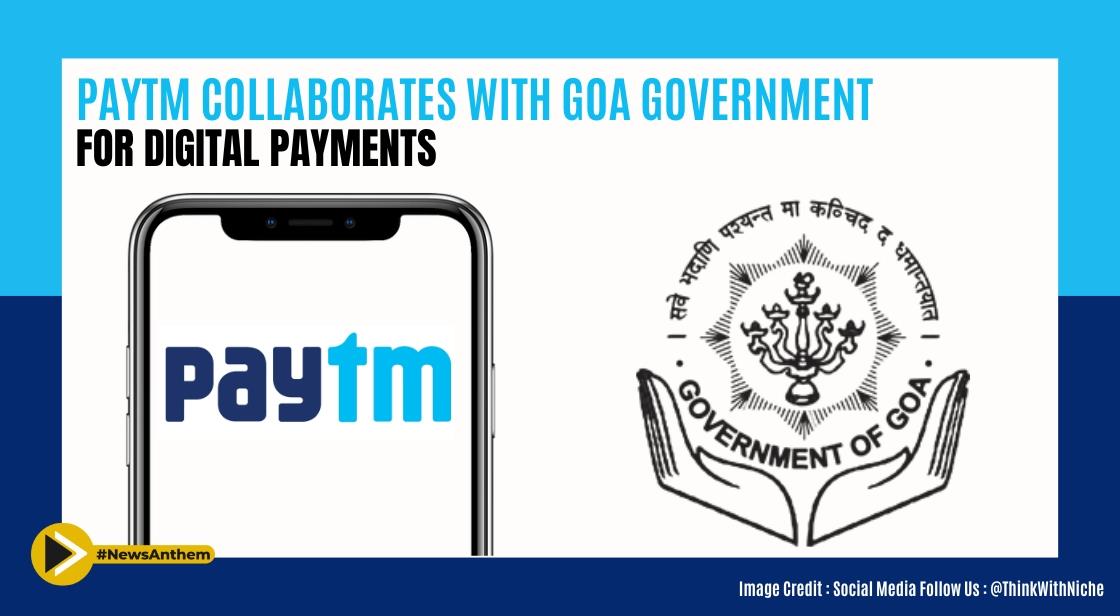Paytm Collaborates with Goa Government for Digital Payments of Electricity, Water, and Municipal Taxes

News Synopsis
Paytm Signs MoU with Goa Government to Streamline Digital Payments
Paytm, the owner of One97 Communications Limited, has signed a memorandum of understanding (MoU) with the Goa government to facilitate digital payments.
This partnership aims to enable users to conveniently make payments for electricity, water, and municipal taxes using various Paytm payment solutions. Find out more about the MoU signing and the benefits it brings to the people of Goa.
The MoU was formalized in the presence of Goa Chief Minister Pramod Sawant and V Candavelou, the state finance secretary.
Expanding Digital Payment Solutions in Goa
As part of this collaboration, Paytm will deploy its cutting-edge payment devices, including Paytm QR codes, soundboxes, and card machines, in various government departments, panchayats, and municipalities.
These devices will facilitate seamless digital payments for essential services such as electricity, water, and municipal taxes. Abhay Sharma, Chief Business Officer of Payments at Paytm, highlighted that users would have multiple payment options available, including Paytm UPI, UPI Lite, Paytm wallet, net banking, and debit/credit cards.
Driving the Digital Revolution in India
Paytm, renowned for its technological innovation, has been instrumental in spearheading India's digital revolution by introducing industry-first payment solutions.
The company's collaboration with the Government of Goa marks another significant step toward promoting digital transactions and empowering users with convenient and secure payment methods.
By leveraging Paytm's innovative solutions, individuals across the state can seamlessly access and pay for various government services.
Promoting Financial Inclusion and Empowerment
Expressing satisfaction with the exclusive MoU, Abhay Sharma emphasized that Paytm's objective is to empower users and drive financial inclusion in India.
The partnership with the Government of Goa enables residents to make hassle-free payments for essential services through user-friendly digital channels.
By embracing digital payments, the government aims to enhance efficiency, reduce cash transactions, and promote transparency in service delivery.
Conclusion
The memorandum of understanding (MoU) signed between Paytm and the Government of Goa marks a significant milestone in the advancement of digital payments in the state.
With the deployment of Paytm's versatile payment devices and solutions, residents of Goa can now conveniently pay for essential services such as electricity, water, and municipal taxes through various digital channels.
This collaboration not only streamlines payment processes but also promotes financial inclusion and empowers individuals with user-friendly and secure payment options.
Paytm's reputation as a leading tech innovator in India resonates through this partnership, demonstrating their commitment to driving the country's digital revolution. By expanding their payment solutions to encompass government services, Paytm continues to spearhead the transition towards a cashless economy.
The collaboration between Paytm and the Government of Goa sets a positive precedent for other regions to embrace digital payment solutions, ultimately enhancing efficiency, transparency, and convenience for citizens.
With the ever-increasing adoption of digital transactions, Goa is poised to become a shining example of a technologically advanced and digitally empowered state.
As Paytm's innovative solutions continue to revolutionize the way people transact, it is clear that the company's vision aligns with the Indian government's goal of promoting a digital and financially inclusive society.
The partnership with the Government of Goa represents another step forward in their shared mission to transform India's payment landscape, empowering individuals and fostering progress in the digital era.
You May Like









